RICHARD’S WEEKEND MOVIE REVIEWS FROM CP24! FRIDAY DECEMBER 5, 2014.
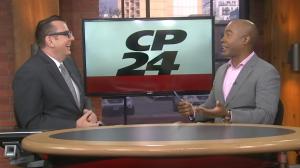 CP24 film critic Richard Crouse reviews “The Hobbit: The Battle of the Five Armies,” “Annie” and “Night at the Museum: Secret of the Tomb.”
CP24 film critic Richard Crouse reviews “The Hobbit: The Battle of the Five Armies,” “Annie” and “Night at the Museum: Secret of the Tomb.”
Watch the whole thing HERE!
 CP24 film critic Richard Crouse reviews “The Hobbit: The Battle of the Five Armies,” “Annie” and “Night at the Museum: Secret of the Tomb.”
CP24 film critic Richard Crouse reviews “The Hobbit: The Battle of the Five Armies,” “Annie” and “Night at the Museum: Secret of the Tomb.”
Watch the whole thing HERE!
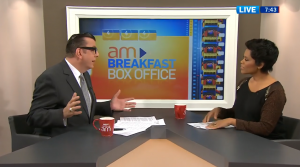 “Canada AM” film critic Richard Crouse reviews “The Hobbit: The Battle of the Five Armies,” “Annie” and “Night at the Museum: Secret of the Tomb.”
“Canada AM” film critic Richard Crouse reviews “The Hobbit: The Battle of the Five Armies,” “Annie” and “Night at the Museum: Secret of the Tomb.”
Watch the whole thing HERE!
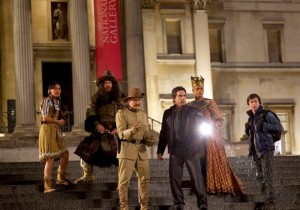 Unless the movie is called “Planet of the Apes” its faint praise to say the monkey is the best thing about a picture. Such is the case with “Night at the Museum: Secret of the Tomb,” the third outing in the popular Ben Stiller kid’s franchise. Crystal the Monkey as Dexter a Capuchin monkey, gets the most laughs and is the only member of the top-of-the-line cast who doesn’t feel like they’re only in it for the big holiday movie paycheque.
Unless the movie is called “Planet of the Apes” its faint praise to say the monkey is the best thing about a picture. Such is the case with “Night at the Museum: Secret of the Tomb,” the third outing in the popular Ben Stiller kid’s franchise. Crystal the Monkey as Dexter a Capuchin monkey, gets the most laughs and is the only member of the top-of-the-line cast who doesn’t feel like they’re only in it for the big holiday movie paycheque.
On the third visit to the New York Natural History Museum we discover the Tablet of Ahkmenrah, the magical Egyptian plaque that gives its life force to the museum’s statues, allowing them to come to life after the sun goes down, is losing its power. Soon the tablet will die and so will animated exhibits Theodore Roosevelt (Robin Williams in one of his last movies), miniature men Jedediah and Octavius (Owen Wilson and Steve Coogan), and a Neanderthal named Laa (Ben Stiller). To save them night guard Larry Daley (Ben Stiller again) travels to the British Museum to find the secret to restoring the artifact’s power.
“Night at the Museum: Secret of the Tomb” beats the original premise into submission, blowing up the idea of a secret nightlife at the museum into the best example this year of how franchise filmmaking can go horribly wrong. Like the dimming tablet that slows down the wax exhibits, this movie sucks the life out of once interesting characters, placing them in a plot that is essentially an excuse to showcase more characters (like Dan Stevens as Sir Lancelot and a surprising and rather charming cameo from a very big star) and bigger special effects than in parts one and two.
There’s plenty of kid friendly slapstick and computer generated effects but a short action scene inside M. C. Escher’s topsy turvy staircase painting shows more imagination than the rest of the movie’s big set pieces put together.
It all feels old hat and despite the nostalgic rush of seeing the late Mickey Rooney and Robin Williams on the big screen, it’s less exciting to see Sir Ben Kingsley as Ahkmenrah’s father delivering bad double entendres like, “I am a pharaoh. Kiss my staff.” Andrea Martin has a fun blink-and-you’ll-miss-it cameo and the above mentioned cameo will raise a laugh, but as I left the theatre I couldn’t help but think my feelings about the film were best summed up by a line Octavius speaks just after a monkey urinates on him. “We must never speak of what happened here.”
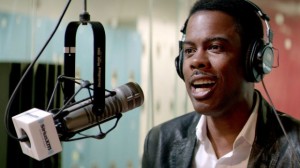 By Richard Crouse – Metro in Focus
By Richard Crouse – Metro in Focus
Bill Murray became a big screen superstar on the back of loose-limbed performances in comedies like Caddyshack, Stripes and Ghostbusters. By 1984, however, he was tiring of playing the clown and looking to do something with a bit more edge.
When director John Byrum gave him a copy of W. Somerset Maugham’s 1944 novel The Razor’s Edge, Murray responded the very next day. Calling the director at 4 am he said, “This is Larry, Larry Darrell,” dropping the name of the novel’s main character, an enigmatic man on a quest for spiritual fulfillment.
The resulting film bombed, with Roger Ebert suggesting Murray played “the hero as if fate is a comedian and he is the straight man.” Of course Murray has gone on to become a credible and in demand dramatic actor, but the story of a comedian’s rocky leap from farce to drama still rings true today.
This weekend Chris Rock’s new comedy Top Five tells the story of Andre Allen, a fictional megastar trying to jump from silly comedies to Uprize, a serious drama about the slave revolt in Haiti.
Top Five is a new twist on an old story. Many comedians have tried to flick the switch from comedy to drama.
The late Robin Williams effortlessly hopped between genres. In 2002 alone he made three films, the lowbrow laffer Death to Smoochy, bookended by the psychodrama One Hour Photo and Christopher Nolan’s thriller Insomnia.
Will Ferrell, Steve Carell and Jonah Hill are best known for funny movies like Blades of Glory, The 40 Year-Old Virgin and Superbad, but each have stretched their dramatic muscles. Ferrell’s Stranger Than Fiction earned a good review from Roger Ebert who said Ferrell “has dramatic gifts to equal his comedic talent.” Carell’s new drama Foxcatcher looks poised to earn him notice at awards time and Jonah Hill is a two time Oscar nominee for heavyweights Moneyball and The Wolf of Wall Street.
Finally, think Jim Carrey and visions of talking butts and rubber-faced features come to mind but he made a serious run at being a serious actor. Perhaps he was pushed into more thoughtful work when his Batman Forever co-star Tommy Lee Jones told him, ‘I cannot sanction your buffoonery,” but whatever the case in movies like Man on the Moon, The Majestic and Eternal Sunshine of the Spotless Mind played it straight. “It’s going to be so hard to talk out of my ass after this,” he said when he won the Golden Globe for Best Actor award for The Truman Show, “but I’ll manage.”
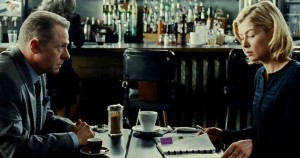 By Richard Crouse – Metro Canada
By Richard Crouse – Metro Canada
In the new film Hector and the Search for Happiness, Simon Pegg plays the title character, a psychologist with a tidy, uneventful existence. He shares his predictable and safe life with Clara (Rosamund Pike), an ad agency writer who creates names for pharmaceuticals. They chug along happily until one day Hector snaps and sets out on an archeological dig of sorts, to discover what happiness means to people.
“With this film,” says Pegg, “people will often flippantly say, ‘He lives with Rosamund Pike, he’s got a nice house…’ which so misses the point. You can have all that stuff. The point is we take the least sympathetic demographic on the face of this earth, the white upper middle class male and say, ‘He has a problem.’ It just goes to show that if he can be there and be unhappy then anybody can be unhappy.”
When asked if show biz success is a recipe for happiness both Pegg and Pike chime in.
“It’s a question I have been asked,” says Pike. “Fame and money, surely they are the ingredients to a happy life? The point is we keep sadly seeing that unless you are happy before you get those things it’s not a recipe for happiness.”
“Not to bring it up in a facile way,” says Pegg, “but Robin Williams’ death is an indication of that. I find for me I have to be happy in my real life, in the real world, and if I’m happy there I can be happy elsewhere and can enjoy this job.
“I’ve been desperately unhappy while working. I remember when I went to LA to do Mission Impossible III I wasn’t in a great place and I got there and I remember thinking to myself, ‘I’m in a film with Tom Cruise and yet I’m unhappy.’ It was an epiphany for me.“
“Obviously the idea of a successful career is that you look like a swan gliding and nobody sees the paddling duck feet,” says Pike, “but they’re definitely there. I think the message of the film is ‘You can’t really know happiness unless you are prepared to embrace life with everything it throws at you.’ The unhappiness too. When you go through something horrific in your life, loss or death or illness or whatever, people say this will make you stronger and you think, ‘Oh sod off,’ but of course it does. It makes you appreciate things in the future more and you do feel happier for having been through the bad times.”
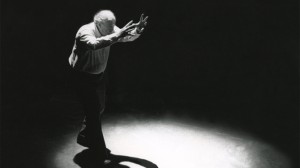 The image of a sandcastle kicks off “Altman,” director Ron Mann’s look at the life and work of Robert Altman. The filmmaker behind movies like “M*A*S*H,” “Nashville” and “The Long Goodbye” once compared making movies to building sand castles, a metaphor he found so powerful he even named his production company Sandcastle 5.
The image of a sandcastle kicks off “Altman,” director Ron Mann’s look at the life and work of Robert Altman. The filmmaker behind movies like “M*A*S*H,” “Nashville” and “The Long Goodbye” once compared making movies to building sand castles, a metaphor he found so powerful he even named his production company Sandcastle 5.
Then later, just before the end credits, the sandcastle disappears. It’s a simple but effective visual summation of Altman’s ethos, build it, watch it go and start all over again.
Mann worked with Altman’s family and colleagues to piece together the personal and professional life of one of the mavericks of American film. The result is a comprehensive documentary that traces Altman’s work back to his roots in industrial filmmaking in Kansas City, to becoming one of television’s most in-demand directors to his iconoclastic work for the big screen. Woven into that narrative is the personal story of the director’s relationship with his wife and business partner of four decades Kathryn and their children.
The story is told in their words—Altman’s reminiscences are culled from 400 hours of footage from his public talks and interviews—accompanied by film clips and unseen until now home movies and stills.
Additional colour comes from the famous faces of Lily Tomlin, Keith Carradine, the late Robin Williams and Elliott Gould, who each answer one question, “What does the word Altman-esque mean to you?” The wide range of answers, which often are pared down to one word or a short phrase, provide a curt but effective glimpse at the unique multiverse Altman created in his life and work.
The result of all these elements is “Altman,” a beautiful and naturalistic portrait of a man, not just his work. It would have been impossible to go in-depth on each of Altman’s 39 films in just ninety minutes, so Mann concentrates on capturing the spirit of a man who built sandcastles over and over again.
 Film critic Richard Crouse discusses the big winners, surprises and highlights from the 2014 Emmy Awards.
Film critic Richard Crouse discusses the big winners, surprises and highlights from the 2014 Emmy Awards.
Watch the whole thing HERE!
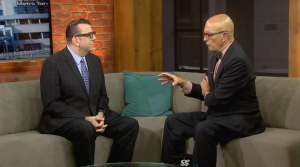 Richard sits in with CP24’s Stephen LeDrew to discuss Robin Williams’s contributions to the big screen.
Richard sits in with CP24’s Stephen LeDrew to discuss Robin Williams’s contributions to the big screen.
Watch the whole thing HERE!
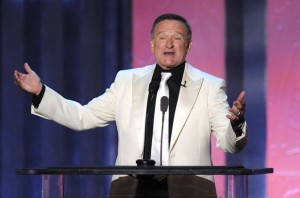 By Richard Crouse – Metro Canada
By Richard Crouse – Metro Canada
The first time I saw Robin Williams was on 90 Minutes Live with Peter Gzowski, a Canadian late night talk show that aired from 1976 to 1978.
Thirty-five years later, I can still remember the frantic burst of energy that emanated from my television that Friday night. Gzowski grinned as the comic careened through their chat, jumping from joke to joke, impression to impression, including Williams’s take on the world’s most intelligent child. “I find most adults very banal, but I’ll talk to you anyway.”
“Where did you get that character from?” Gzowski asked, “Was it based on anyone?”
“Me, basically. As a kid.”
“Were you brilliant as a child?”
“Yes, and as a young man, too,” replied the impish 27-year-old.
The stand up comedians I had seen on television wore suits and told one-liners. This was stream of consciousness, a wild look at a comedic mind that didn’t work the way I was accustomed to. For six minutes it felt like an alien had taken control of my TV, a life force like I had never seen before.
Appropriately enough, soon afterward he appeared as Mork, the extraterrestrial from Ork, on Happy Days and his career was officially launched.
For the next 35 years Williams was a constant on our screens, big and small. His first starring role in a movie, 1980’s Popeye, was met with critical scorn and a weak box office, but Roger Ebert had praise for the star, calling Williams’ “perpetual squint and lopsided smile” completely convincing.
Moving from strength to strength he embarked on a remarkable run of films, earning the first of three Best Actor Oscar nods for Good Morning, Vietnam and winning an Academy Award for his work as an empathetic therapist in Good Will Hunting. A handful of Golden Globes celebrated his work in Good Morning, Vietnam, The Fisher King and Mrs. Doubtfire.
He leaves a diverse legacy from the laughs of The Birdcage, to the drama of Awakenings,to the chills of One Hour Photo, the seize-the-day uplift of Dead Poets Society and the ad-libbed brilliance of Aladdin. Every decade since that appearance on 90 Minutes Live has given us a memorable Williams performance. He will live, on the screen at least, with three more films scheduled for release this year and next.
Everyone has a favourite Robin Williams character. For me its Parry, the treasure hunter in The Fisher King. It’s a funny, bittersweet performance in a movie that mixes fantasy and reality in equal doses.
“I’m a knight on a special quest,” Parry says, words that could apply to the comedian’s crusade to entertain in weird and wonderful ways.